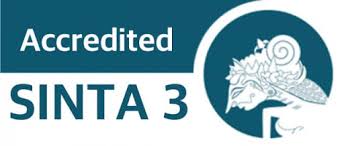Tri Pusat Pendidikan Sebagai Pembinaan Akhlak Di Sekolah Dasar Negeri
DOI:
https://doi.org/10.54069/attadrib.v4i2.146Keywords:
Three Education Centers, Elementary Schools, MoralsAbstract
The study describes the concept of harmonization of three educational centers in moral development at UPT SD Negeri 230 Tondok Tangnga, Tanalili District, North Luwu Regency. This research is a qualitative research that uses a pedagogical approach. Sources of data, namely primary data sourced from school principals, PAI teachers, parents of students, the community. Meanwhile, secondary data were taken from documents related to the research. The instrument used in collecting data is the researcher himself who functions to determine and select informants as data sources, analyze data, interpret data, and the instruments in collecting data are observation, interviews, and documentation. The results showed that the role of the family as the basis of education, the school as the developer of education and the community as the user. An important role in the development and growth of students, both physically and spiritually, mentally spiritually and physically. The implementation of the harmonization of the Three Education Centers is carried out with close cooperation, it can be seen when parents lay the foundations of education, especially the family in the formation of personality. Then it is developed in a school environment with educational materials in the form of knowledge and skills. The community participates in controlling, distributing and fostering and improving it.
Downloads
References
Bayu, Y., & Rahmadina, A. (2020). Peran Orang Tua dalam Menanamkan Nilai Karakter Kearifan Lokal Pada Masyarakat Pesisir. Edukasi, 14(2), 145–150.
Davidson, M., Lickona, T., & Khmelkov, V. (2014). Smart & good schools a new paradigm for high school character education. Handbook of Moral and Character Education. https://doi.org/10.4324/9780203114896
Departemen Agama RI, al-Qur’an dan Terjemahnya, Jakarta: Yayasan Penyelenggara Penerjemah/Penafsir al-Qur’an, 2010.
Fadlilah, A. N. (2020). Strategi Menghidupkan Motivasi Belajar Anak Usia Dini Selama Pandemi COVID-19 melalui Publikasi. Jurnal Obsesi?: Jurnal Pendidikan Anak Usia Dini, 5(1), 373. https://doi.org/10.31004/obsesi.v5i1.548
Hartoyo, h. A. (2011). Potensi Pembinaan Karakter Berbasis Budaya Masyarakat, 1, 19–30.
Helaluddin, & Syawal, S. (2018). Psikoanalisis Sigmund Freud dan Implikasinya dalam Pendidikan. Research Gate, (March), 1–16.
Ismail Suwardi Wekke, Arhanuddin Salim, Y. S. (2018). Pendidikan Karakter Dalam Masyarakat Bugis. Ijtimaiyya: Jurnal Pengembangan Masyarakat Islam, 11(1), 41–62. https://doi.org/10.24042/ijpmi.v11i1.3415
Marzuki. (2013). Revitalisasi Pendidikan Agama Di Sekolah Dalam Pembangunan Karakter Bangsa Di Masa Depan. Jurnal Pendidikan Karakter, (1), 64–76. https://doi.org/10.21831/jpk.v0i1.1288
Mumpuniarti. (2012). Pembelajaran Nilai Keberagaman Dalam Pembentukan Karakter Siswa Sekolah Dasar Inklusi. Jurnal Pendidikan Karakter, (3). https://doi.org/10.21831/jpk.v0i3.1231
al-Nasir, Muhammad Zuhair Bin Nasir. (1422 H). Bab Idha Aslama al-Sabi Fama>ta Hal Yusalla ‘Alaihi Wa Hal Yu’Radu ‘Ala al-Sabi al-Islam, Cet. I, Juz II, nomor hadis 1358, Beirut: Dar Tauq al-Najah Musawwarah ‘An al-Sultaniyah Bi Idafat Tarqim Muhammad Fuad ‘Abd al-Baqi.
Nurnaningsih, N. (2015). Rekonstruksi Falsafah Bugis dalam Pembinaan Karakter: Kajian Naskah Paaseng Toriolo Tellumpoccoe. Jurnal Lektur Keagamaan, 13(2), 393. https://doi.org/10.31291/jlk.v13i2.232
Rahmat Rifai Lubis, dkk. (2020). Pembelajaran Al-Qur’an Era Covid-19: Tinjauan Metode dan Tujuannya pada Masyarakat di Kutacane Aceh Tenggara. Kutta: Jurnal Ilmu Pendidikan Islam, 4(2), 1–9. https://doi.org/10.30736/ktb.v4i2.275
Rustan, Edhy, Miftahul Jannah Akmal, (2020), The Role Of Mubaligh And Parents In Growing Children’s Character In Kampong Gayau Sarawak Malaysia, Al-Balagh: Jurnal Dakwah dan Komunikasi, Vol. 5, No. 2, July – December, 193-222.
Shihab, M. Quraish. (1996). Wawasan al-Qur?an: Tafsir Maudhu`I atas Pelbagai Persoalan Umat. Bandung: Mizan, 321.
Sumarti, (2021) Kepala UPT SD Negeri 230 Tondok Tangnga, wawancara, pada tanggal 03 Februari di Sidobinangun.
Suyanti, Titik, (2021) Guru Kelas I, wawancara, pada tanggal 16 Februari di Sidobinangun.
Tom Lickona, Eric Schaps, C. L. (2002). Eleven Principles of Effective Character Education.
T. E. Lickona, Schaps, and C. Lewis. (2003). CEP’s Eleven Principles of Effective Character Education, Washington DC: Character Education Partnership, 56.
Yunus, Nurseha, M. (2020). Culture of Siri’ in Learning Akidah Akhlak in MAN Suli Luwu District Budaya Siri’ dalam. JIEBAR?: Journal of Islamic Education: Basic and Applied Research, 01, 107–120.
Yunus, M. (2020). SOSIAL-BUDAYA: HARMONISASI AGAMA DAN BUDAYA DALAM PENDIDIKAN TOLERANSI. Kalam Jurnal Agama Dan Sosial Humaniora, 8(2), 1–26.
Yusuf, Munir (2018). Pengantar Ilmu Pendidikan, (Palopo: Lembaga Penerbit Kampus IAIN Palopo, 29.
Downloads
Published
How to Cite
Issue
Section
License
Copyright (c) 2021 Nur Afni Fauziah, Yunus Salik

This work is licensed under a Creative Commons Attribution-ShareAlike 4.0 International License.





